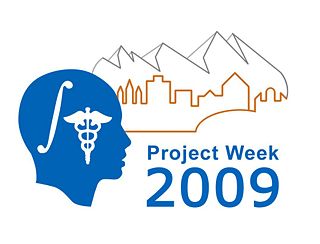Difference between revisions of "2009 Winter Project Week LungImagingPlatform"
From NAMIC Wiki
| Line 19: | Line 19: | ||
<h1>Objective</h1> | <h1>Objective</h1> | ||
| − | Our goal is to develop a lung imaging platform for the clinical understanding of multiple lung diseases | + | Our goal is to develop a lung imaging platform for the clinical understanding of multiple lung diseases such as Chronic Obstructive Pulmonary Disease (COPD), Asthma, and Interstitial Lung Disease (ILD) among others. Quantitative lung imaging is a key component of on-going genetic and molecular biology studies that are being carried out at BWH and other centers across USA. A significant example of these new efforts is [[http://www.copdgene.org/|COPD Genetics Epidemiology]] multicenter study. The NAMIC Kit and Slicer 3 are ideal candidates for the implementation of such efforts. |
Our goals for this week are threefold: | Our goals for this week are threefold: | ||
| Line 31: | Line 31: | ||
<h1>Approach, Plan</h1> | <h1>Approach, Plan</h1> | ||
| − | Our approach is to develop a module in Slicer 3 that | + | Our approach is to develop a module in Slicer 3 that has the following components: |
| − | * A unique library that can be | + | * A unique library that can be linked against and shared by other Slicer modules or external applications. |
| − | * Command Line Modules that encapsulate the individual | + | * Command Line Modules that encapsulate the individual algorithmic components of the platform without strings attached to a particular solution. The idea is to enable rapid prototyping and deployment of the solutions before they are fully integrated. |
* Custom solutions for disease-oriented applications: our plan is to discuss how an explication can customize the Slicer 3 layout. | * Custom solutions for disease-oriented applications: our plan is to discuss how an explication can customize the Slicer 3 layout. | ||
Revision as of 03:20, 3 January 2009
Home < 2009 Winter Project Week LungImagingPlatform Return to Project Week Main Page |
[[]] | [[]] |
Key Investigators
- James Ross
- Raul San Jose
Objective
Our goal is to develop a lung imaging platform for the clinical understanding of multiple lung diseases such as Chronic Obstructive Pulmonary Disease (COPD), Asthma, and Interstitial Lung Disease (ILD) among others. Quantitative lung imaging is a key component of on-going genetic and molecular biology studies that are being carried out at BWH and other centers across USA. A significant example of these new efforts is [Genetics Epidemiology] multicenter study. The NAMIC Kit and Slicer 3 are ideal candidates for the implementation of such efforts.
Our goals for this week are threefold:
- Design the main platform components.
- Dynamic programming approaches for the extraction of 3D airways.
- Porting our current imaging platform, [Airway Inspector] based on 3D Slicer to Slicer 3.
Approach, Plan
Our approach is to develop a module in Slicer 3 that has the following components:
- A unique library that can be linked against and shared by other Slicer modules or external applications.
- Command Line Modules that encapsulate the individual algorithmic components of the platform without strings attached to a particular solution. The idea is to enable rapid prototyping and deployment of the solutions before they are fully integrated.
- Custom solutions for disease-oriented applications: our plan is to discuss how an explication can customize the Slicer 3 layout.
We will focus on the following design aspects:
- MRML data structures for tubular-type anatomical structures.
- Support for quantitative imaging: handling data tables in Slicer 3 from MRML to Command Line Modules.
- ITK filter hierarchies for the main image analysis components: extraction of lung lobes, airways and vessels.
- Customizable GUI layout.
Progress
- A semiautomatic lobe segmentation has been successfully implemented in Slicer 3 as a Command Line Module.
- Initial design needs have been discussed.